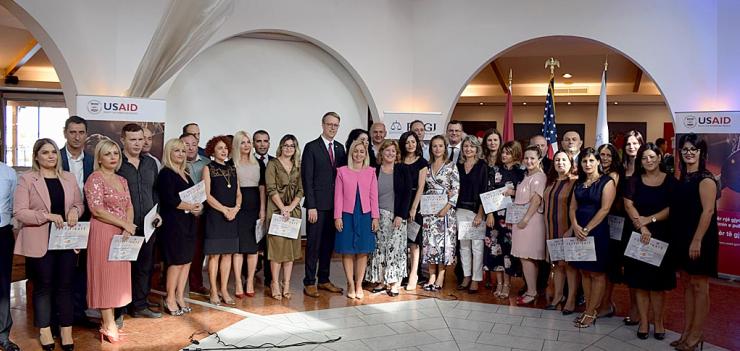The 2017 justice sector reform in Albania added new layers to the mandate of the School of Magistrates by including Chancellors and other court administration staff in the school’s continuing professional education programs.
Since its creation in 1997, the School of Magistrates (SoM) in Albania has been responsible for the education and continuing professional training of judges and prosecutors. The 2016 justice reform introduced several new categories of training responsibility to the SoM including the initial training for Chancellors and continuing training for court administration staff, legal advisors and more. The SoM must now coordinate with both the High Judicial Council and High Prosecutorial Council to train their respective personnel. These new mandates revealed the two-fold need for designing a comprehensive court administration training program, developing new faculty and advancing the existing faculty’s teaching skills.
The SoM was upfront about their lack of expertise in the new areas and, paired with their struggles to advance the basic educational programming through needs assessment, curriculum development and advanced training techniques, the challenge was too daunting to tackle alone. Therefore, in 2017, the USAID Justice for All (JfA) program implemented by EWMI, initiated a project to assist the SoM with meeting the new demands.
THE CHANGE STARTS FROM INSIDE
Judicial training bodies are truly effective when they determine training needs and then design, deliver, and evaluate the quality of their programs. Hence, USAID Justice for All focused on building faculty competencies to do all of these, as the first steps toward changing adult education and strengthening human capacities. The goal was not merely to advance the skills of faculty but to also enable the faculty to transfer their knowledge to members of the judiciary so they too can train their own people. Seasoned faculty ensures the sustainability of training efforts.
“The Faculty Development program was geared towards preparing trainers to be equipped with the necessary adult education knowledge, and render them capable of communicating that knowledge to other professionals. The techniques and methodologies applied during the training will serve as models for the SoM for a long time,” says Mariana Simini, SoM Faculty.
A BLUEPRINT FOR EFFECTIVE CAPACITY BUILDING
JfA initiated a series of Faculty Development workshops to prepare the SoM faculty to effectively deliver the “Court Administration Program” (CAP), another intiative developed by the USAID Justice for All program. The workshops advanced the existing experience and expertise of the SoM faculty in two main areas: curriculum development on court administration and presentation skills that transition faculty from lecture to participatory methods. While the Faculty Development workshops were conducted for the existing faculty of the SoM, in the future the program will include new faculty members and trainers from the courts and High Judicial Council.
Visible Immediate Impact
The Faculty Development Workshops were put to good use as the CAP program was piloted in June and July 2019. Changes to SoM presentation styles were immediately noticeable - gone was the reliance on lecture as the primary training technique and in its place were experiential teaching methods such as case studies, role plays and group discussions.
For Saimir Shyti, Serious Crimes Court Chancellor and CAP participant, “The training met all my expectations. The topics were well presented in interactive training sessions. Amazing preparation and eloquence... particularly how they delivered the training in such a way that the participants retained their energy.”
Keeping Up the Foward Motion
Migrating from substance-based lectures to skill building and values-based education has been a positive experience for SOM faculty. The new CAP curriculum that faculty piloted in 2019 requires faculty to transform the way they teach. This shift for SOM faculty is about becoming more practical, broader in scope, less substantive in focus, more self-directed in application and more experiential in method. The SOM experience in adopting adult learning methodologies has aligned them to the field of adult education.
The far-reaching impact of the Faculty Development highlights the expected improvements in service delivery. The Chancellors who attended the CAP training appreciated the interactive curriculum and participatory teaching methods. Faculty Development has begun to transform the way SoM faculty teach, ultimately improving educational effectiveness.

